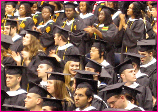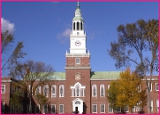Posted on March 20th, 2011 by Mary Lord
 As anxious students hover by computer screens or mailboxes for news of college admissions, they face even more disappointment than even the record-breaking class of 2009. Though the number of high school seniors fell in many states last year, they continue to apply to more schools. The average now tops 4.5, with a hefty percentage applying to eight or more colleges.
As anxious students hover by computer screens or mailboxes for news of college admissions, they face even more disappointment than even the record-breaking class of 2009. Though the number of high school seniors fell in many states last year, they continue to apply to more schools. The average now tops 4.5, with a hefty percentage applying to eight or more colleges.
Read More
Filed under: K-12 Education News | Comments Off on Rise in College Applications Fuels Uncertainty
Tags: College, Education Policy, Higher Education, Public Policy, Research
Posted on August 16th, 2010 by Jaimie Schock
 Early college high-school programs — a.k.a., dual-enrollment programs — are growing in popularity. The programs allow high schoolers to take college courses, and earn college credits, while still in high school. Historically, they were geared toward high-achieving students to keep them from getting bored. But, many are now aimed at low-income students at risk of dropping out.
Early college high-school programs — a.k.a., dual-enrollment programs — are growing in popularity. The programs allow high schoolers to take college courses, and earn college credits, while still in high school. Historically, they were geared toward high-achieving students to keep them from getting bored. But, many are now aimed at low-income students at risk of dropping out.
Read More
Filed under: K-12 Education News | Comments Off on Dual Enrollment May Help At-Risk Students
Tags: College, Education Policy, Grades 9-12, Research on Learning
Posted on July 5th, 2010 by ASEE
 High school graduates from low- to middle-income families are finding it harder to enroll in four-year, public universities because the costs of attending the schools are rising well beyond what federal, state, and institutional grants will cover, the Department of Education reports.
High school graduates from low- to middle-income families are finding it harder to enroll in four-year, public universities because the costs of attending the schools are rising well beyond what federal, state, and institutional grants will cover, the Department of Education reports.
Read More
Filed under: K-12 Education News | Comments Off on Four-year College Out of Reach for Many
Tags: College, Education Policy, Public Policy, Research on Learning
Posted on May 10th, 2010 by Jaimie Schock
 A recent survey of 1,000 students ages 12 to 17 conducted for Junior Achievement and the Allstate Foundation found that 63 percent of respondents admitted that tight finances have forced them to change their college plans. How? By working more hours, opting for instate schools, delaying enrollment for a year or going to a community college.
A recent survey of 1,000 students ages 12 to 17 conducted for Junior Achievement and the Allstate Foundation found that 63 percent of respondents admitted that tight finances have forced them to change their college plans. How? By working more hours, opting for instate schools, delaying enrollment for a year or going to a community college.
Read More
Filed under: K-12 Education News | Comments Off on Economy Alters College Plans
Tags: College, Research on Learning
Posted on April 19th, 2010 by Jaimie Schock
 Middle school science teachers in five New Hampshire and Vermont school districts will be getting some classroom help from STEM graduate students at Dartmouth College. The college recently received a five-year, $2.5 million National Science Foundation (NSF) grant to help bring about collaborations between the grad students and teachers. The grants should help the grad students “acquire value-added skills,” including the ability to communicate STEM subjects to both technical and nontechnical audiences and how best to enrich K-12 STEM learning and instruction.
Middle school science teachers in five New Hampshire and Vermont school districts will be getting some classroom help from STEM graduate students at Dartmouth College. The college recently received a five-year, $2.5 million National Science Foundation (NSF) grant to help bring about collaborations between the grad students and teachers. The grants should help the grad students “acquire value-added skills,” including the ability to communicate STEM subjects to both technical and nontechnical audiences and how best to enrich K-12 STEM learning and instruction.
Read More
Filed under: K-12 Education News | Comments Off on NSF Funds College-Middle School Collaborations
Tags: College, National Science Foundation
Posted on April 19th, 2010 by Jaimie Schock
 How well do America’s future math teachers stack up against their counterparts around the world? Just so-so, according to a new Michigan State University study released last week. They earned an average C grade, and were well and truly aced by rivals from education-centric countries like Singapore and Taiwan.
How well do America’s future math teachers stack up against their counterparts around the world? Just so-so, according to a new Michigan State University study released last week. They earned an average C grade, and were well and truly aced by rivals from education-centric countries like Singapore and Taiwan.
Read More
Filed under: K-12 Education News | Comments Off on C Grade for Future U.S. Math Teachers
Tags: College, Math teachers, Mathematics, Research on Learning, Teacher Training
Posted on April 5th, 2010 by Jaimie Schock

The best way to combat income inequity in America is to expand economic opportunity via higher education, according to two Brookings Institution economists in their new book, Creating an Opportunity Society. To start preparing more children of poor families for college, authors Ron Haskins and Isabel V. Sawhill say increased emphasis should be placed on preschool education.
Read More
Filed under: K-12 Education News | Comments Off on Higher Education Key to Better Incomes
Tags: College, Education Policy, Grades Pre K-2, Public Policy
Posted on March 29th, 2010 by Jaimie Schock
 Around half of all high school graduates who enroll in college don’t finish, and a recent poll of employers found that 40 percent of the new grads they hire don’t have the skills necessary to advance in their jobs. But experts agree that, so far, there is no good way to measure how college- and career-ready students are; hence the White House making $350 million available to states to develop new assessments.
Around half of all high school graduates who enroll in college don’t finish, and a recent poll of employers found that 40 percent of the new grads they hire don’t have the skills necessary to advance in their jobs. But experts agree that, so far, there is no good way to measure how college- and career-ready students are; hence the White House making $350 million available to states to develop new assessments.
Read More
Filed under: K-12 Education News | Comments Off on What Does ‘College Ready’ Mean?
Tags: Career Planning, College, Education Policy, Public Policy, Research, Research on Learning
Posted on March 22nd, 2010 by Jaimie Schock
 The National Academy of Engineering has launched its Grand Challenges K-12 Partners Program, where colleges of engineering across the U.S. can join a regional partners program. The colleges would provide primary and secondary schools with engineering materials and curricula appropriate for various grade levels, offer professional training to teachers, and host regional STEM conferences.
The National Academy of Engineering has launched its Grand Challenges K-12 Partners Program, where colleges of engineering across the U.S. can join a regional partners program. The colleges would provide primary and secondary schools with engineering materials and curricula appropriate for various grade levels, offer professional training to teachers, and host regional STEM conferences.
Read More
Filed under: K-12 Education News | Comments Off on K-12 Educators Enlisted for ‘Grand Challenges’
Tags: College, Grand Challenges, National Academy of Engineering, Resources for Teachers
 As anxious students hover by computer screens or mailboxes for news of college admissions, they face even more disappointment than even the record-breaking class of 2009. Though the number of high school seniors fell in many states last year, they continue to apply to more schools. The average now tops 4.5, with a hefty percentage applying to eight or more colleges.
As anxious students hover by computer screens or mailboxes for news of college admissions, they face even more disappointment than even the record-breaking class of 2009. Though the number of high school seniors fell in many states last year, they continue to apply to more schools. The average now tops 4.5, with a hefty percentage applying to eight or more colleges. 








 Early college high-school programs — a.k.a., dual-enrollment programs — are growing in popularity. The programs allow high schoolers to take college courses, and earn college credits, while still in high school. Historically, they were geared toward high-achieving students to keep them from getting bored. But, many are now aimed at low-income students at risk of dropping out.
Early college high-school programs — a.k.a., dual-enrollment programs — are growing in popularity. The programs allow high schoolers to take college courses, and earn college credits, while still in high school. Historically, they were geared toward high-achieving students to keep them from getting bored. But, many are now aimed at low-income students at risk of dropping out. High school graduates from low- to middle-income families are finding it harder to enroll in four-year, public universities because the costs of attending the schools are rising well beyond what federal, state, and institutional grants will cover, the Department of Education reports.
High school graduates from low- to middle-income families are finding it harder to enroll in four-year, public universities because the costs of attending the schools are rising well beyond what federal, state, and institutional grants will cover, the Department of Education reports.  A recent survey of 1,000 students ages 12 to 17 conducted for Junior Achievement and the Allstate Foundation found that 63 percent of respondents admitted that tight finances have forced them to change their college plans. How? By working more hours, opting for instate schools, delaying enrollment for a year or going to a community college.
A recent survey of 1,000 students ages 12 to 17 conducted for Junior Achievement and the Allstate Foundation found that 63 percent of respondents admitted that tight finances have forced them to change their college plans. How? By working more hours, opting for instate schools, delaying enrollment for a year or going to a community college. Middle school science teachers in five New Hampshire and Vermont school districts will be getting some classroom help from STEM graduate students at Dartmouth College. The college recently received a five-year, $2.5 million National Science Foundation (NSF) grant to help bring about collaborations between the grad students and teachers. The grants should help the grad students “acquire value-added skills,” including the ability to communicate STEM subjects to both technical and nontechnical audiences and how best to enrich K-12 STEM learning and instruction.
Middle school science teachers in five New Hampshire and Vermont school districts will be getting some classroom help from STEM graduate students at Dartmouth College. The college recently received a five-year, $2.5 million National Science Foundation (NSF) grant to help bring about collaborations between the grad students and teachers. The grants should help the grad students “acquire value-added skills,” including the ability to communicate STEM subjects to both technical and nontechnical audiences and how best to enrich K-12 STEM learning and instruction. How well do America’s future math teachers stack up against their counterparts around the world? Just so-so, according to a new Michigan State University study released last week. They earned an average C grade, and were well and truly aced by rivals from education-centric countries like Singapore and Taiwan.
How well do America’s future math teachers stack up against their counterparts around the world? Just so-so, according to a new Michigan State University study released last week. They earned an average C grade, and were well and truly aced by rivals from education-centric countries like Singapore and Taiwan.
 Around half of all high school graduates who enroll in college don’t finish, and a recent poll of employers found that 40 percent of the new grads they hire don’t have the skills necessary to advance in their jobs. But experts agree that, so far, there is no good way to measure how college- and career-ready students are; hence the White House making $350 million available to states to develop new assessments.
Around half of all high school graduates who enroll in college don’t finish, and a recent poll of employers found that 40 percent of the new grads they hire don’t have the skills necessary to advance in their jobs. But experts agree that, so far, there is no good way to measure how college- and career-ready students are; hence the White House making $350 million available to states to develop new assessments. The National Academy of Engineering has launched its Grand Challenges K-12 Partners Program, where colleges of engineering across the U.S. can join a regional partners program. The colleges would provide primary and secondary schools with engineering materials and curricula appropriate for various grade levels, offer professional training to teachers, and host regional STEM conferences.
The National Academy of Engineering has launched its Grand Challenges K-12 Partners Program, where colleges of engineering across the U.S. can join a regional partners program. The colleges would provide primary and secondary schools with engineering materials and curricula appropriate for various grade levels, offer professional training to teachers, and host regional STEM conferences.